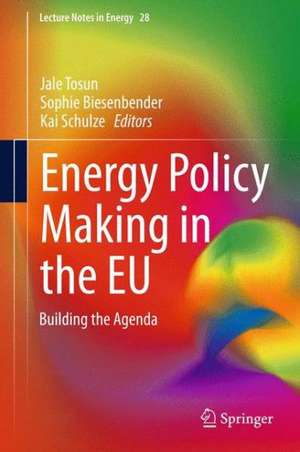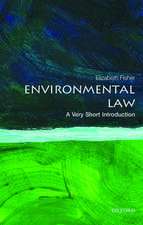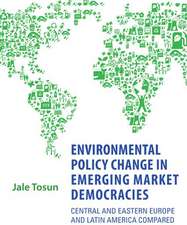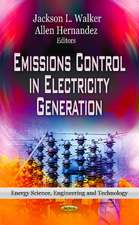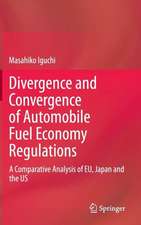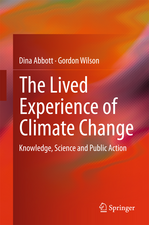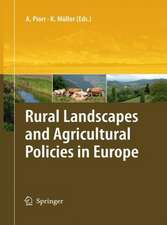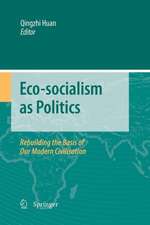Energy Policy Making in the EU: Building the Agenda: Lecture Notes in Energy, cartea 28
Editat de Jale Tosun, Sophie Biesenbender, Kai Schulzeen Limba Engleză Hardback – 21 ian 2015
When are energy issues likely to find their way to the agenda of European policymakers? This is the key research question guiding this collection of empirical studies, which will shed light on both successful and unsuccessful attempts to include energy issues in the European agenda. The multi-level political system of the European Union represents a particularly fruitful setting for addressing this question due to the multiple institutional access points it provides for different groups of actors. The book has three key benefits. First, it provides a theory-informed analysis of agenda setting processes in general and in the European Union in particular. Second, it presents an overview of the most important and emerging dimensions on European energy policy, and third, it helps to develop a research agenda for future research in the field.
| Toate formatele și edițiile | Preț | Express |
|---|---|---|
| Paperback (1) | 386.99 lei 6-8 săpt. | |
| SPRINGER LONDON – 27 sep 2016 | 386.99 lei 6-8 săpt. | |
| Hardback (1) | 394.29 lei 6-8 săpt. | |
| SPRINGER LONDON – 21 ian 2015 | 394.29 lei 6-8 săpt. |
Din seria Lecture Notes in Energy
-
 Preț: 401.61 lei
Preț: 401.61 lei -
 Preț: 436.35 lei
Preț: 436.35 lei - 15%
 Preț: 655.60 lei
Preț: 655.60 lei - 18%
 Preț: 952.09 lei
Preț: 952.09 lei - 18%
 Preț: 1012.84 lei
Preț: 1012.84 lei - 15%
 Preț: 635.80 lei
Preț: 635.80 lei - 15%
 Preț: 645.96 lei
Preț: 645.96 lei - 15%
 Preț: 645.47 lei
Preț: 645.47 lei - 15%
 Preț: 640.06 lei
Preț: 640.06 lei - 15%
 Preț: 649.71 lei
Preț: 649.71 lei - 15%
 Preț: 643.84 lei
Preț: 643.84 lei - 18%
 Preț: 954.31 lei
Preț: 954.31 lei - 15%
 Preț: 643.84 lei
Preț: 643.84 lei - 18%
 Preț: 949.73 lei
Preț: 949.73 lei - 18%
 Preț: 1411.69 lei
Preț: 1411.69 lei - 15%
 Preț: 634.18 lei
Preț: 634.18 lei - 15%
 Preț: 649.87 lei
Preț: 649.87 lei - 15%
 Preț: 642.03 lei
Preț: 642.03 lei - 18%
 Preț: 957.62 lei
Preț: 957.62 lei - 15%
 Preț: 652.49 lei
Preț: 652.49 lei - 18%
 Preț: 963.15 lei
Preț: 963.15 lei -
 Preț: 361.03 lei
Preț: 361.03 lei -
 Preț: 391.79 lei
Preț: 391.79 lei - 15%
 Preț: 646.11 lei
Preț: 646.11 lei -
 Preț: 391.22 lei
Preț: 391.22 lei - 18%
 Preț: 954.45 lei
Preț: 954.45 lei - 18%
 Preț: 957.62 lei
Preț: 957.62 lei - 15%
 Preț: 647.27 lei
Preț: 647.27 lei - 18%
 Preț: 960.30 lei
Preț: 960.30 lei - 18%
 Preț: 1250.74 lei
Preț: 1250.74 lei - 15%
 Preț: 642.18 lei
Preț: 642.18 lei - 15%
 Preț: 639.41 lei
Preț: 639.41 lei -
 Preț: 488.71 lei
Preț: 488.71 lei
Preț: 394.29 lei
Nou
Puncte Express: 591
Preț estimativ în valută:
75.47€ • 82.01$ • 63.44£
75.47€ • 82.01$ • 63.44£
Carte tipărită la comandă
Livrare economică 22 aprilie-06 mai
Preluare comenzi: 021 569.72.76
Specificații
ISBN-13: 9781447166443
ISBN-10: 1447166442
Pagini: 210
Ilustrații: X, 263 p. 14 illus.
Dimensiuni: 155 x 235 x 23 mm
Greutate: 0.56 kg
Ediția:2015
Editura: SPRINGER LONDON
Colecția Springer
Seria Lecture Notes in Energy
Locul publicării:London, United Kingdom
ISBN-10: 1447166442
Pagini: 210
Ilustrații: X, 263 p. 14 illus.
Dimensiuni: 155 x 235 x 23 mm
Greutate: 0.56 kg
Ediția:2015
Editura: SPRINGER LONDON
Colecția Springer
Seria Lecture Notes in Energy
Locul publicării:London, United Kingdom
Public țintă
ResearchCuprins
Building the EU’s Agenda in Energy Policy Making: An Introduction.- Characteristics of Agenda Setting.- Agenda Setting in the Multi-Level System of the EU.- Renewable Energy in the EU.- Biofuels in the EU.- Energy Security in the EU: The Role of Enlargement.- Liberalization of the European Energy Market.- Gas Flaring in the EU.- Hydrological Fracturing: Scientific Uncertainty and Failed Agenda Setting.- Failed Harmonization of Nuclear Power Policy.- Feed-in Tariffs in the EU.- Building the EU’s Agenda in Energy Policy Making: Conclusions.
Notă biografică
All three editors have broad experience in executing empirical analyses in political science, with a strong emphasis on comparative research in environmental policy, energy policy, social policy and consumer protection policy. The editors have been involved in international research networks. Two possess teaching experience at universities in Germany as well as in Canada, Estonia, Italy and Turkey.
Textul de pe ultima copertă
The book adopts an innovative analytical approach to agenda setting by not only presenting successful cases in which energy issues were addressed by means of public policy, but by also analyzing failed attempts to make issues part of the European policy agenda. Another outstanding feature of the book is its use of the latest empirical data on a broad range of energy issues.
When are energy issues likely to find their way to the agenda of European policymakers? This is the key research question guiding this collection of empirical studies, which will shed light on both successful and unsuccessful attempts to include energy issues in the European agenda. The multi-level political system of the European Union represents a particularly fruitful setting for addressing this question due to the multiple institutional access points it provides for different groups of actors. The book has three key benefits. First, it provides a theory-informed analysis of agenda setting processes in general and in the European Union in particular. Second, it presentsan overview of the most important and emerging dimensions on European energy policy, and third, it helps to develop a research agenda for future research in the field.
When are energy issues likely to find their way to the agenda of European policymakers? This is the key research question guiding this collection of empirical studies, which will shed light on both successful and unsuccessful attempts to include energy issues in the European agenda. The multi-level political system of the European Union represents a particularly fruitful setting for addressing this question due to the multiple institutional access points it provides for different groups of actors. The book has three key benefits. First, it provides a theory-informed analysis of agenda setting processes in general and in the European Union in particular. Second, it presentsan overview of the most important and emerging dimensions on European energy policy, and third, it helps to develop a research agenda for future research in the field.
Caracteristici
Discusses successful and unsuccessful attempts to include energy issues in the European policy agenda Presents successful cases in which energy issues were addressed by means of public policy and analyzes failed attempts to make issues part of the European policy agenda Helps to develop a research agenda for future research Includes supplementary material: sn.pub/extras
